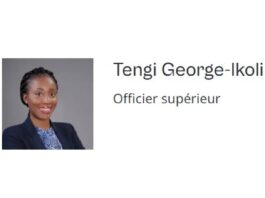Despite blatant violations of the Global Transparency Initiative’s rules, Exxon has once again been appointed to a senior position on the EITI Board. Members will elect a new Board on 12 June in Dakar, Senegal.
The Extractive Industries Transparency Initiative (EITI) was founded on a clear principle: companies must declare what they have paid to governments for oil, gas and minerals, and countries must declare how much they have received. These declarations help citizens to hold their governments accountable for the use of revenues from natural resources, so that the funds are used for the development of their country rather than being diverted to corruption or lost through poor governance.
In the 20 years since its creation, the organisation’s multi-stakeholder Board – which includes equal representation from companies, national governments and civil society – has demanded increasingly comprehensive information from its members. However, despite being a founding member of the EITI and sitting on its Board for many years, ExxonMobil has still not met the most basic disclosure requirement – payments to governments at project level in all the countries where it operates.
Worse still, in 2021, Exxon was caught lobbying the US Securities and Exchange Commission (SEC) against a rule that would require project-level disclosure of payments to governments under the EITI. As a member of the EITI Board, Exxon should have been promoting this rule, rather than lobbying to ensure that the US had weaker transparency regulations. And Exxon’s efforts were successful: when the SEC finalised the rule – after more than a decade since the US passed its landmark government transparency law (Dodd-Frank 1504) – it mirrored the proposal of Exxon and its allies at the American Petroleum Institute, gutting the EITI-aligned project-level disclosure requirement.
After discovering Exxon’s lobbying activities, Publish What You Pay-US (PWYP-US), a civil society organisation, filed a complaint with the EITI, requesting that Exxon be removed from the EITI Board. The EITI Board ultimately decided not to remove Exxon at that time, and the Chairman instructed the Board to create more rigorous expectations for companies supporting the EITI and to put in place a mechanism to enforce them.
The EITI Secretariat, which is responsible for taking forward the day-to-day operations of the initiative, also carried out an initial assessment of company compliance with the EITI’s expectations of companies. In what was certainly no surprise to anyone, the assessment revealed that Exxon was not meeting expectations, and in particular that it was not meeting the requirement to disclose payments to governments at the project level in each jurisdiction in which it operates.
The Board responded to the Chairman’s call by clarifying and reinforcing its expectations of companies, including adding new provisions. It has also agreed to assess its member companies against these expectations prior to each members’ meeting (usually held every three years). While progress has been made in holding companies accountable for failing to meet expectations, the enforcement mechanism ultimately remains too weak: the only real sanction companies face for failing to meet EITI expectations is not being considered for representation on the EITI Board.
And yet, despite still failing to meet this fundamental requirement, ExxonMobil has once again been appointed to a leadership role on the EITI Board. No other company appointed to the Board meets this requirement.
The vote will take place on Monday 12 June in Dakar, Senegal
Exxon’s nomination was put forward by the company’s members, including the other current board members: AngloAmerican, BHP Foundation, BP, Equinor, Kosmos Energy, Newmont Corporation, Rio Tinto, Shell, TotalEnergies and Trafigura. It is difficult to understand why these companies, which meet the EITI requirements for disclosure of payments to governments at the project level, would appoint a representative who does not meet this fundamental expectation.
Starting on Monday, the EITI will hold its Global Conference in Dakar, Senegal. At the first day’s General Assembly – the first meeting of its kind in four years – the EITI plans to confirm its new Board. Under EITI procedures, it is not possible to vote against a single candidate for the Board. Members must accept or reject the entire Board slate, including all company, country and civil society representatives.
If the companies do not replace Exxon’s appointment with that of a compliant company, they risk blocking the approval of the new board of directors.
The EITI Secretariat hides important data
When the EITI rejected the complaint against Exxon, PWYP-US withdrew from the EITI, accusing the organisation of being captured by the companies on its board. Over the past year, Oxfam has kept a close eye on the situation, trying to hold the EITI to account, particularly with regard to company expectations. During preparations for the members’ meeting in Dakar, we were dismayed by the role played by the EITI secretariat in protecting companies from public scrutiny.
When given the opportunity to comment on this blog, the Secretariat stated that it “followed the process approved by the Board, which all stakeholders had discussed and agreed”. However, Oxfam staff attended the relevant meetings and know that the proposed process was never submitted to the Board for decision, only for information, and was strongly opposed by many Board members at many meetings.
According to the updated Company Expectations, the EITI Secretariat must assess companies against the Company Expectations prior to the General Meeting, and publish the results following the company review. Less than a week before the Dakar meeting, the Secretariat has still not published the results of this assessment. The Secretariat claims that “the publication of the results is motivated by the tight schedule required to complete the evaluation”. Yet the timetable was clear more than a year ago, in February 2022, when the company’s expectations were revised and the board agreed to an evaluation process that would inform board appointments.
Civil society Board members are actively asking the EITI secretariat to share the disaggregated results, rightly explaining that it is impossible for members to vote on the Board if they cannot know whether or not companies are complying with expectations.
The Secretariat stated that it would publish the disaggregated results one week after the Dakar conference, i.e. well after the time when it would be useful to take them into account for the selection of the Board of Directors.
While we call on the EITI Secretariat to play its part in promoting transparency and to publish the disaggregated results without further delay, even without these results, a simple review of Exxon’s public statements shows that the facts remain the same: Exxon is still not disclosing its data on payments to governments at project level. As such, the company should not be on the EITI Board.
Exxon’s inclusion undermines EITI’s credibility
As the global standard for transparency and good governance in the oil, gas and mining sectors, the EITI is in a unique position to establish best practice for the industry. When a company like Exxon, whose aim is to hinder global progress on transparency, manages to grab a seat on the board, it holds the whole organisation back. This makes it more difficult to revise the EITI standard to include essential updates needed for a just energy transition and the global energy future, such as mandatory and full disclosures of greenhouse gas emissions, fossil fuel subsidies or energy transition plans and forecasts.
The presence on the Board of a company that fails to meet expectations – and lobbies against the EITI – risks reducing the EITI to an exercise in corporate greenwashing, a seal of approval that companies can buy to give the impression that they are doing their bit to promote good governance.
The fact that a company playing a leading role in the organisation does not meet its basic requirements also makes the designation of “EITI supporting company” essentially meaningless. Investors will not be able to consider a company’s engagement in EITI as a component of assessing a company’s position on environmental, social and governance (ESG) standards.
In addition, by not applying its expectations to EITI-supporting companies, the EITI faces a major credibility challenge with its implementing countries. Implementing countries are regularly assessed against the EITI standard (known as ‘validations’). When countries fail to meet the requirements of the standard, they are given guidelines for improvement, suspended or, in the most serious cases, expelled from the organisation. Countries have lobbied for similar corporate accountability, and Exxon’s brazen appointment risks undermining the organisation’s ability to continue to hold countries to account for meeting their own obligations.
As the world grapples with the climate crisis, transparency is more important than ever. The EITI can play a vital role, but not if it is led by those who seek to undermine its core mission.
We call on other members of the EITI Association to join us on Monday in opposing Exxon’s appointment to the Board.
Source: Oxfam will oppose any EITI board that includes ExxonMobil | Oxfam (oxfamamerica.org)






